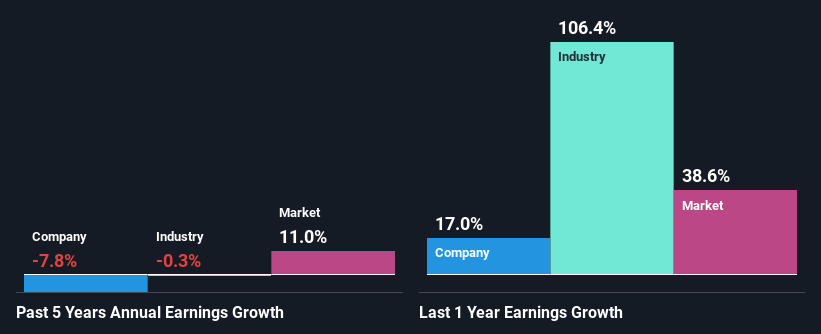- Australia
- /
- Office REITs
- /
- ASX:DXS
Dexus' (ASX:DXS) Stock Been Rising But Financials Look Weak: Should Shareholders Be Worried?

Most readers would already know that Dexus' (ASX:DXS) stock increased by 1.9% over the past month. However, its weak financial performance indicators makes us a bit doubtful if that trend could continue. Specifically, we decided to study Dexus' ROE in this article.
Return on equity or ROE is an important factor to be considered by a shareholder because it tells them how effectively their capital is being reinvested. Put another way, it reveals the company's success at turning shareholder investments into profits.
Check out our latest analysis for Dexus
How Do You Calculate Return On Equity?
Return on equity can be calculated by using the formula:
Return on Equity = Net Profit (from continuing operations) ÷ Shareholders' Equity
So, based on the above formula, the ROE for Dexus is:
9.1% = AU$1.1b ÷ AU$13b (Based on the trailing twelve months to June 2021).
The 'return' is the yearly profit. One way to conceptualize this is that for each A$1 of shareholders' capital it has, the company made A$0.09 in profit.
What Is The Relationship Between ROE And Earnings Growth?
We have already established that ROE serves as an efficient profit-generating gauge for a company's future earnings. Depending on how much of these profits the company reinvests or "retains", and how effectively it does so, we are then able to assess a company’s earnings growth potential. Assuming everything else remains unchanged, the higher the ROE and profit retention, the higher the growth rate of a company compared to companies that don't necessarily bear these characteristics.
Dexus' Earnings Growth And 9.1% ROE
On the face of it, Dexus' ROE is not much to talk about. Next, when compared to the average industry ROE of 13%, the company's ROE leaves us feeling even less enthusiastic. For this reason, Dexus' five year net income decline of 7.8% is not surprising given its lower ROE. However, there could also be other factors causing the earnings to decline. Such as - low earnings retention or poor allocation of capital.
As a next step, we compared Dexus' performance with the industry and found thatDexus' performance is depressing even when compared with the industry, which has shrunk its earnings at a rate of 0.3% in the same period, which is a slower than the company.

The basis for attaching value to a company is, to a great extent, tied to its earnings growth. What investors need to determine next is if the expected earnings growth, or the lack of it, is already built into the share price. This then helps them determine if the stock is placed for a bright or bleak future. Has the market priced in the future outlook for DXS? You can find out in our latest intrinsic value infographic research report.
Is Dexus Efficiently Re-investing Its Profits?
Dexus has a very high three-year median payout ratio of 75%, implying that it retains only 25% of its profits. However, it's not unusual to see a REIT with such a high payout ratio mainly due to statutory requirements. Accordingly, this likely explains why its earnings have been shrinking.
Moreover, Dexus has been paying dividends for at least ten years or more suggesting that management must have perceived that the shareholders prefer dividends over earnings growth. Upon studying the latest analysts' consensus data, we found that the company is expected to keep paying out approximately 75% of its profits over the next three years. Regardless, Dexus' ROE is speculated to decline to 5.9% despite there being no anticipated change in its payout ratio.
Conclusion
In total, we would have a hard think before deciding on any investment action concerning Dexus. Because the company is not reinvesting much into the business, and given the low ROE, it's not surprising to see the lack or absence of growth in its earnings. With that said, we studied current analyst estimates and discovered that analysts expect the company's earnings growth to improve slightly. The company's existing shareholders might have some respite after all. To know more about the company's future earnings growth forecasts take a look at this free report on analyst forecasts for the company to find out more.
If you're looking to trade DEXUS, open an account with the lowest-cost platform trusted by professionals, Interactive Brokers.
With clients in over 200 countries and territories, and access to 160 markets, IBKR lets you trade stocks, options, futures, forex, bonds and funds from a single integrated account.
Enjoy no hidden fees, no account minimums, and FX conversion rates as low as 0.03%, far better than what most brokers offer.
Sponsored ContentNew: Manage All Your Stock Portfolios in One Place
We've created the ultimate portfolio companion for stock investors, and it's free.
• Connect an unlimited number of Portfolios and see your total in one currency
• Be alerted to new Warning Signs or Risks via email or mobile
• Track the Fair Value of your stocks
Have feedback on this article? Concerned about the content? Get in touch with us directly. Alternatively, email editorial-team (at) simplywallst.com.
This article by Simply Wall St is general in nature. We provide commentary based on historical data and analyst forecasts only using an unbiased methodology and our articles are not intended to be financial advice. It does not constitute a recommendation to buy or sell any stock, and does not take account of your objectives, or your financial situation. We aim to bring you long-term focused analysis driven by fundamental data. Note that our analysis may not factor in the latest price-sensitive company announcements or qualitative material. Simply Wall St has no position in any stocks mentioned.
About ASX:DXS
DEXUS
Dexus (ASX: DXS) is a leading Australasian fully integrated real asset group, managing a high-quality Australasian real estate and infrastructure portfolio valued at $54.5 billion.
Reasonable growth potential average dividend payer.
Similar Companies
Market Insights
Community Narratives




